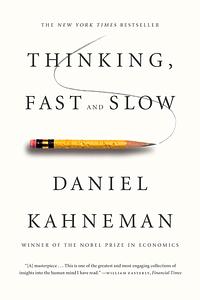You need to sign in or sign up before continuing.
Take a photo of a barcode or cover
Not as good as the Black Swan, perhaps because it wasn't written as catty, but still instructive to imagine life as these scholars have it, traveling from one place to another trying to figure out how each other are wrong.
Really great info in here and in my option very important for people to know and understand cognitive biases. Closer to 4.5 stars and only getting a minor deduction due to it being pretty wordy, although the context that's provided is important. I got through this on audiobook so the lengthy descriptions were cumbersome at times, but I imagine it could be easier to skim to the relevant bits in the print copy.
Main takeaway: humans are great at perceiving the world around them, but terrible at interpreting it correctly and using that information to make smart decisions. Overall, a great read if you want to gain a better understanding of the flaws in human cognitive processes, though some sections/chapters are more interesting than others-- I didn't really care for the section on finances (although I learned that the stock market is essentially BS)-- but the sections on constructing narratives for the world around us, use of intuition, and inevitable biases were fascinating. Almost too much food for thought to digest at the same rate as an average nonfiction book.
challenging
informative
inspiring
slow-paced
This book is an extremely well-constructed book with digestible chapters and sections that lead to poignant epiphanies. I very much enjoyed the arguments Kahneman laid out and how he saw them through. It's interesting because he would return to the same basic principles, but it didn't feel repetitive, it just added a new perspective.
My only complaint is that he speaks a lot about statistics and decision making around them, but it doesn't speak to the decision making in murky situations where statistics might not be present. I'd be curious about this since much of the future is unprecedented to some degree or, at least, a new enough version of the past to introduce uncertainty. And how are we to process this?
My only complaint is that he speaks a lot about statistics and decision making around them, but it doesn't speak to the decision making in murky situations where statistics might not be present. I'd be curious about this since much of the future is unprecedented to some degree or, at least, a new enough version of the past to introduce uncertainty. And how are we to process this?
informative
reflective
medium-paced
informative
medium-paced
Nearly 15 years have passed since this seminal book was published. Many of the concepts of the machinery of thinking and our cognitive biases are now established /accepted theories. But I found this admittedly long and detailed work extremely interesting and useful for better understanding my own thought process and see it as a critical tool for communication and decision making as well as for informing program design, policy and interventions for communities.
informative
reflective
slow-paced


